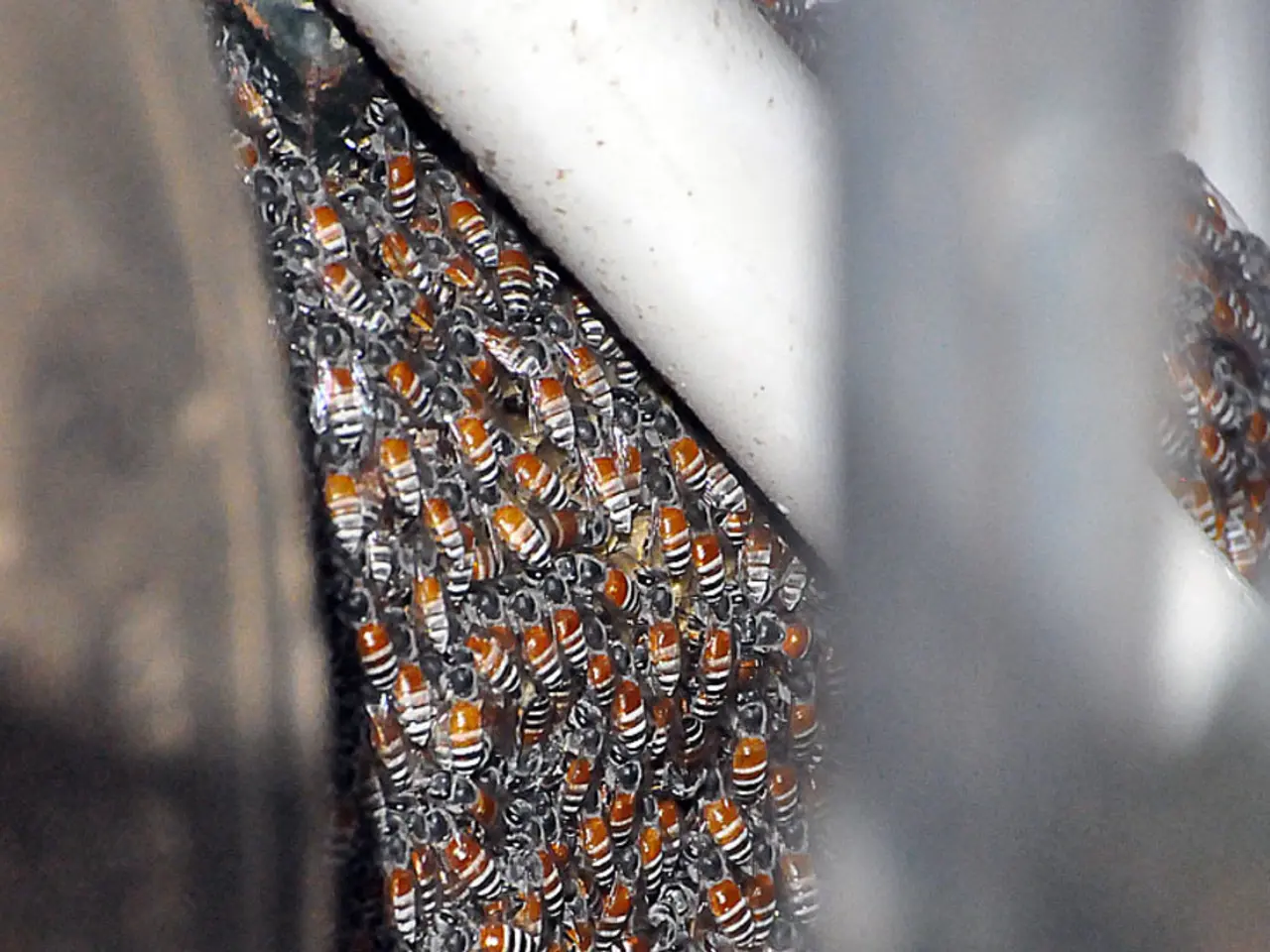Bee colonies identified as "Killer Bees" reportedly located in the vicinity of Georgia, prompting safety concerns.
In recent developments, Africanized honeybees, also known as "killer bees," have been identified in Barbour County, Alabama, just across the border from Quitman County, Georgia [1][2][4][5]. These bees, known for their aggressive and potentially lethal behavior, pose a significant threat to both public health and agriculture in the region.
A hybrid of European and African honeybees, Africanized bees are notorious for their extremely aggressive behavior and tendency to swarm and sting in large numbers [1][3]. They can chase people nearly a mile and even sting through standard beekeeping suits, making them a formidable danger. Incidents in other states have resulted in deaths and hospitalizations, with some people being stung thousands of times [3].
The presence of Africanized bees near Georgia's border is a cause for concern, particularly given the state's mild winters and expanding beekeeping community, which create conditions conducive to their establishment and spread [2][3]. Georgia Agriculture Commissioner Tyler Harper has stated that while there is no immediate need for Georgians to be concerned, vigilance is essential [1][2].
From an agricultural perspective, Africanized bees pose a direct threat because their aggressive behavior can interfere with conventional beekeeping operations, crop pollination, and livestock safety [1]. Beekeepers are urged to monitor hive behavior closely and consider replacing queens with European stock to maintain less aggressive colonies [2].
Public health agencies and agricultural officials emphasize the importance of prompt reporting of aggressive colonies and preparedness to respond swiftly if swarms appear in Georgia [1][2]. Climate factors also play a role, with wetter climates like Georgia's potentially limiting the survival of these bees compared to drier regions, but warming temperatures could facilitate further northward expansion in coming years, heightening risks for agriculture and public safety [3].
Julia Mahood, president of the Georgia Beekeepers Association, underscores the need for respect and caution when dealing with these aggressive bees, stating that when they are encountered, they need to be removed [6]. Experts advise avoiding bees to prevent attacks [7].
It's important to note that the sighting of Africanized bees in Barbour County, Alabama, is considered an isolated event from the state's own sightings of the aggressive invaders. However, local beekeepers are encouraged to report any overly aggressive colonies in Georgia to help prevent their establishment in the state [8].
In summary, the current distribution of Africanized honeybees is primarily in Barbour County, Alabama, near Georgia's border. Their aggressive behavior poses a significant public health risk, with the potential for fatal stings, and a direct threat to Georgia agriculture. Public health and agricultural officials are urging vigilance, prompt reporting of aggressive colonies, and preparedness to respond swiftly if swarms appear in Georgia.
| Aspect | Details | |--------------------------|-------------------------------------------------------------------------------------------| | Current Distribution | Primarily in Barbour County, Alabama near Georgia border; past isolated detections in Georgia (Dougherty, Decatur counties) eliminated before establishment | | Public Health Impact | Highly aggressive with potential for fatal stings; threat to residents and livestock | | Agricultural Impact | Threatens beekeeping and pollination; may disrupt local agriculture | | Monitoring & Response | Active surveillance, DNA testing, collaboration with beekeepers; prompt elimination of swarms | | Climate Considerations | Wetter climate may slow spread; warming trends could facilitate expansion |
[1] Georgia Department of Agriculture. (n.d.). Africanized Honeybee Information. Retrieved from https://agr.georgia.gov/honeybees/africanized-honeybee-information [2] Georgia Public Broadcasting. (2021, March 1). Africanized Honeybees Spotted in Georgia. Retrieved from https://www.gpb.org/news/2021/03/01/africanized-honeybees-spotted-in-georgia [3] National Geographic Society. (n.d.). Africanized Honeybee. Retrieved from https://www.nationalgeographic.org/encyclopedia/africanized-honeybee/ [4] Alabama Department of Agriculture and Industries. (n.d.). Africanized Honeybees. Retrieved from https://www.agi.alabama.gov/bees/africanized-honeybees/ [5] Smithsonian Tropical Research Institute. (n.d.). Africanized Honeybees. Retrieved from https://www.stri.si.edu/science/bees/africanized-honeybees [6] Georgia Beekeepers Association. (n.d.). About Us. Retrieved from https://georgiabekeepers.org/about-us/ [7] Experts advise avoiding bees to prevent attacks. (2021, March 1). Retrieved from https://www.cbs46.com/local-news/africanized-honeybees-spotted-in-georgia/ [8] Local beekeepers encouraged to report overly aggressive colonies. (2021, March 1). Retrieved from https://www.11alive.com/article/news/local/georgia/africanized-honeybees-spotted-in-georgia/85-68e1e6b0-2c35-4903-a97a-592b85f87f1e
- The future threat of Africanized honeybees to environmental-science, particularly in regions with mild winters and expanding beekeeping communities, is a matter of concern.
- Advancements in technology, such as DNA testing, are crucial for monitoring and responding to the presence of Africanized bees, and tracking their potential spread in the environment.
- With the rising prominence of health-and-wellness and sports-related activities in society, knowledge about the aggressive behavior of Africanized bees and the need for precaution is essential for the safety of athletes and outdoor enthusiasts.
- As the mix of European and African honeybees, Africanized bees could become a significant factor in the future of mixed-martial-arts events held in regions where they are present, given the potential for disturbances caused by their aggressive behavior.




